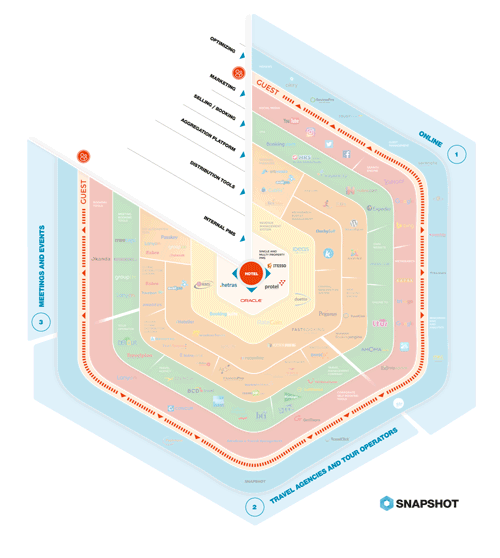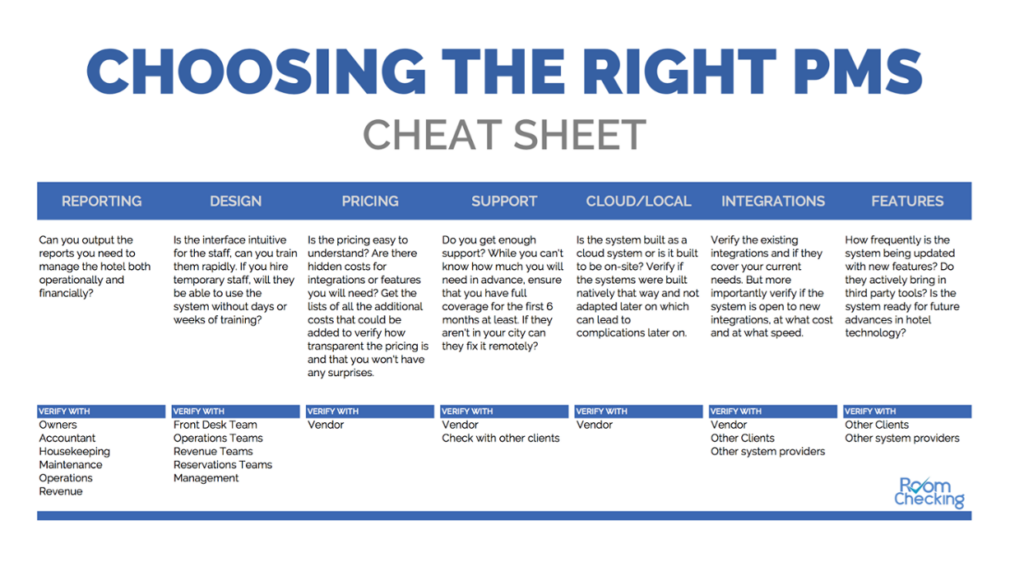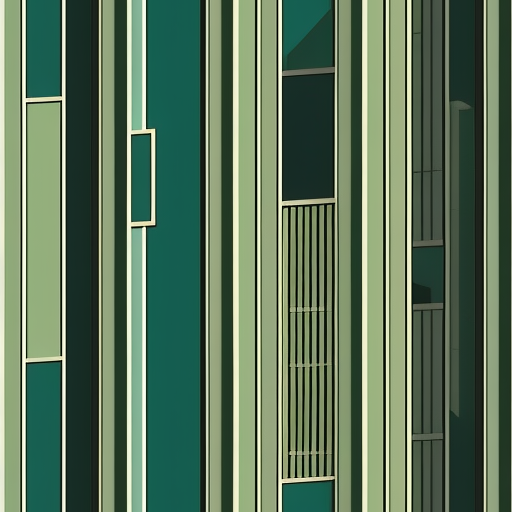
For a hotelier, choosing a PMS can be one of the most time consuming and stressful experiences ever. Buy the wrong system and, one year from now, you will feel like that guy who chose a Zune mp3 player over an iPod. The truth is that, with the always increasing number of companies out there claiming to be the best “turnkey solution” for you, it’s easy to get lost and confused so, before you even start considering your options, let’s get back to basics.
As we deploy RoomChecking into hundreds of hotels, we sometimes encounter hotels regretting their decisions on their choice of PMS system. Lack of integrations or complex and expensive integrations processes is often the first issue we encounter. So we went out to ask some hoteliers what they most wanted to see if they could have their dream PMS system today and here is a summary of their replies.
But first, What is a PMS?
PMS is short for Property Management System, a software that facilitates the management of your property by aggregating data from different operational departments (housekeeping, management, food & beverage, accounting, etc.) and automatizing operations (invoicing, reservation management, room assignment, etc.).
On top of that, PMS plays a strategic role too, as it collects vital data such as ADR, RevPar, pickup and occupancy rate, all information that are crucial to staying competitive and profitable. To use an anatomy analogy, it is safe to say that PMS is the “heart” of your hotel and, just like a human heart, it “pumps” blood to all the 3rd party solutions integrated to it: channel manager, booking engine, CRS, Yield Management software, POS and so on.
This chart gives you an idea of how a PMS system connects to the many other systems that hotels need.

Is your current PMS the right solution?
But, how can you know if your “heart” is working properly? A lot of hotels get lost in technicalities, while the only question that matters should be “is my current PMS making my life easier?”. Often the answer we have from hotels is “I don’t know, ” and that is a scary position to be in, because it’s a “no, it’s not” with an “it’s too complicated even to understand it” attached to it. So let’s try to dig into the common problems with PMSs.
Integrations: know before you choose
That’s one of the key factors when analyzing your current PMS or thinking about getting a new one. Sure, it does the job, and it’s not very expensive, but it’s not integrated with your channel manager, so your booking department has to manually manage each reservation, an operation that is not only time consuming, but increases the risk of human error. And “human error,” when it comes to hotels is synonymous with “overbooking” and “unsold rooms.” Scary, isn’t it? So if you don’t know where to look to evaluate your PMS, start from here: make a list of all the 3rd parties you work with and check how many of them can and cannot be integrated with your PMS.

“Compatible” and “integrated” are two of the words that recurred more often in the interviews we made with hoteliers while writing this article, so it looks like there’s a lot of dissatisfaction with them. Knowing in advance that they can be a big deal when it comes to choosing a PMS will save you from bad surprises later on.
To get an idea of just the basic integrations that hotels need to have, this chart from SnapShot illustrates it quite well.
Cloud or On-Premise?
If you’ve been in this business long enough, you will surely remember those clunky systems from the 90’s. Back then all PMS were physically installed on every single computer that needed to have access to the system, with data physically stored on one or more servers in the hotel. This meant that any possible hardware issue would have to be managed directly, with little to no support from the PMS. Not to mention the costs involved with buying the hardware, having backups servers in case something went wrong or just the simple discomfort you had to deal with if one computer crashed during a busy check-out morning.
Cloud-based software, on the other hand, is deployed over the Internet and is stored and maintained by the PMS itself. You can access it from any computer without installing anything. The front-office computer gets a virus, and it’s unusable? No problem: you can keep working on your laptop or your smartphone, without losing any data. Server goes down? PMS will deal with it, and you don’t have to worry over the performances of your hardware infrastructures. That being said, a lot of hotels are still using “on-premise” (aka “server based” or “legacy”) PMS. Why? Surprisingly enough, often it’s just a question of not wanting to deal with the stress and anxiety involved in the change. Let’s get a better look at it.
Retraining your staff
PMS are complicated, period. They process a big amount of data, and even to the most advanced user, it takes some training to get into them. Now, if you have a small bed and breakfast with four employees, retraining them to use the new PMS should not be a tough task. But if you’re running a 500 room property with restaurants, meeting rooms, and wellness center, this can turn into a nightmare if you don’t choose the right system. The manager of a group of independent hotels in San Francisco, when interviewed for this article, told us that one of the most important features for a PMS is a “simple, elegant, concise user interface for hourly employees.” Another general manager from the Czech Republic used almost the same words: “Ease of use for receptionists, with a great and intuitive workflow.” If you already changed one PMS you know the amount of stress that this experience brings and, if you don’t, take this article as a warning. To paraphrase philosopher William of Ockham "If you have two equally likely solutions to a problem, choose the simplest," that usually works out great when selecting a PMS.
Are tired of staff floor never being aware of the check out?*Give RoomChecking a try now
What now?
Answering the three points mentioned above should already give you enough information to choose your PMS, but of course, every hotel has different and specific needs, and it’s important that you write down a list of tasks that are crucial for your business and that your PMS should be able to fulfill. We spoke to several hoteliers while writing this and we came across some interesting (and sometimes unexpected) requests.
Pricing transparency is one of those: with a lot of modules and integrations available it is easy to get lost in the estimations. Make sure that you do understand all the features listed in the PMS quote before you buy.
Reporting is another: a PMS can integrate terabytes of data every minute, but if it does not provide a readable and understandable reporting system, then it’s completely useless. PMS providers tend to be “data-freak”, and often they like to store data for the only reasons for doing so but, to keep your business operational and profitable, you need to be able to extract the information you need without getting lost in millions of useless data. Make sure to check a few original reports before you choose your PMS. If you do not feel comfortable with them, then move on.
Support is another feature frequently discussed during our interviews: understand what the PMS can and can’t do for you, when it can do it (choose, if possible, a 24/7 support, especially if you’re buying a PMS from a provider not in your timezone), and if and how much it will cost you. You could need to integrate a new booking engine down the line, and you want to avoid bad surprises when it comes to hidden costs.
Some hoteliers even mentioned mobile check-in/out as a feature they would love to have, together with dedicated apps for smartphones to make employees and the guest experience better. Based on the level of technology of your property this could be a cool add on.
Final consideration
As you see, choosing a PMS is a crucial decision that may (and will) affect your business in both good or bad ways. It’s not something that can be done in a superficial manner and, most important, without having all the info to base your decision. Take the time to compare features, ask for demos and presentations and always think about where you want to be with your hotel in five years. Can the PMS help you reach your future goals, or is it just a temporary solution? And, never forget the only question that matters: “is it making your life easier?”


